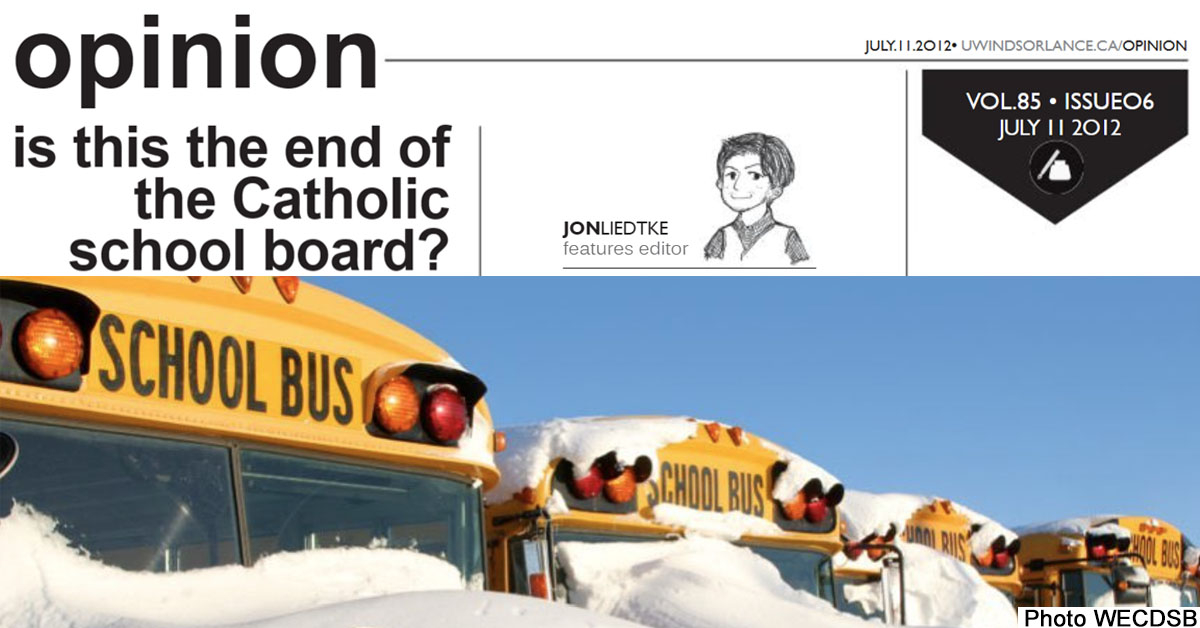UWindsor Lance
Issue 06, Volume 85
July 11, 2012
Jon Liedtke
One of the greatest inequities perpetuated by the Ontario government is the public funding of the Catholic school system.
While historically, the reason for the public funding of the school board is grounded in overall public being, and indeed not stemming from perceived religious preference by the state, such is not the case today. At the time of confederation, political leaders debated over how to accommodate the different faiths in the province in regard to education. The decision was to create one Catholic, and one Protestant school board, to represent both the English and French cultural and religious backgrounds. This decision was set into the British North America Act of 1867. As time progressed and overall society began to embrace secularism, our Protestant board evolved into the public board we know today, and the Catholic board remained, Catholic.
As a province, by having a publicly funded religious school board we are stating quite clearly and unequivocally that the preferred religion in Ontario is Catholic, and that it deserves the justification of full public funding to continue its existence.
Such a situation is not equitable, nor inclusive.
The U.N. deemed our province to be participating in ‘discriminatory acts’ by providing full funding to Roman Catholic schools, while at the same time denying full funding to other religious schools. What exactly is equitable in allowing a
religious institution to receive full funding to educate students, while explicitly telling other religious groups they are not entitled to the same rights?
Students of different religious backgrounds who attend the public board have the potential to perceive issues of equity at far too young an age to understand their implications and historical justifications, and this could reaffirm this special status to
Catholics— a special status which shouldn’t exist.
Issues of inclusiveness also arise. Separating students into different school boards ensures that different ideological backgrounds are developed at young ages, and this can fragment and fracture society. The goals of our province’s multicultural
policies is to foster inclusiveness and respect for all cultures; and currently, we are actively working against that goal.
The solutions to this problem are obvious and require little study. If we are seeking to increase societal equity, the province can l) completely secularize the educational system, thus removing public funding from the Roman Catholic school board;
or 2) grant full public funding to every religious group which wishes to educate their students.
Education should not stem from religious dogma, at home, nor at school. It is not the role of the state to impose religiosity upon its students. While private religious schools are permitted to operate in the province— so long as they comply with
our overall curriculum— there is no justification for the public funding of them.
The issue of removing funding from the Roman Catholic school board is a controversial issue, and no political party wants to deal with it. A politician who wants to remove funding appears to be anti-Catholic, rather than pro-secularization. Thus, virtually no party has spoken to the issue directly. Parties have instead actively sought to extend funding to all religious groups. The only exception being the Green Party, who wanted to see the Roman Catholic board stripped of all public funding.
Further, with sizable cutbacks in librarians, support staff and teachers, closures and the merging of schools, the fact that you do not have to be Catholic to attend a Catholic school, and that members of different religious backgrounds are often exempt from religious studies within Catholic schools, should surely highlight the need to eliminate such a system.
The only equitable and financially sound route to take is simply to remove public funding from the Roman Catholic board, rending education secular in Ontario. It is our duty to ensure that every student receives the same level of education provided
by the state, and we cannot ensure that such is the case now. We also must ensure that the state, in no way, confers preferential treatment upon a religious group. Our current system needs to end if we are to continue to pursue our policy of multiculturalism in good faith, and if we are attempting to provide equity for our students.
Jon Liedtke was the Features and Opinions Editor, Advertising Manager and Deficit Consultant at the UWindsor Lance.




Leave a Reply